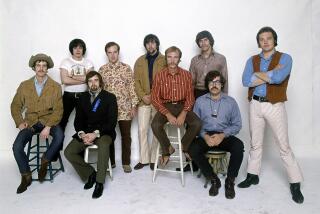Bad Religion keeps faith with punk rock
- Share via
A funny thing happened to punk band Bad Religion on the way to what its members fully expected to be a James Dean existence: They fully embraced the “live fast” part of that manifesto, but somehow forgot to die young.
The veteran Southland band, formed in 1980 by a group of bright teenage rebels at El Camino Real High School in Woodland Hills, finds itself in the slightly surreal position of gearing up for a 30th anniversary tour and a raft of related activities this year.
“We used to say, ‘Never trust anyone over 30,’ ” guitarist Brett Gurewitz, 47, said during an interview last week at the group’s record label headquarters in Silver Lake. With a sheepish laugh, he quickly added, “Anyone -- that does not apply to bands.”
He was flanked by the group’s other remaining original members -- singer Greg Graffin and bassist Jay Bentley -- at the offices of Epitaph Records, the equally hardy indie label that Gurewitz started in 1981 as an outlet for the band’s own music.
On Wednesday, they’ll undertake a string of 17 House of Blues concerts in Anaheim, San Diego, West Hollywood and Las Vegas over the next three weeks, for which they’ll be joined once more by longtime band members Greg Hetson (formerly of the Circle Jerks) and Brian Baker, both on guitar, and drummer Brooks Wackerman.
“This isn’t about what happened 30 years ago,” Bentley, 45, said. “It’s about 30 years of us being in the scene.”
Graffin, displaying punk’s time-honored antipathy toward self-aggrandizement or gratuitous self-promotion, elaborated: “We couldn’t be around for this long if it wasn’t for the expansion and the continued vibrancy of the punk scene. To me, that’s the celebration. I’ve tried to deflect the accolades [for the band] and say it’s really about the community. If you didn’t have a community to play to, then what good is it?”
That community still shows up, well, religiously for Bad Religion shows, often with its children -- and even some grandchildren -- in tow, which makes the group as strong a draw in concert as ever. As a thank-you for that loyalty, the band will record a live album during the early part of the tour and make it available as a free download for those who sign up on the band’s website.
“Never underestimate Bad Religion,” Goldenvoice chief Paul Tollett once said of the group’s remarkable longevity, despite minimal radio airplay typically available to hard-core punk groups. But then, punk itself has outlasted all predictions of a quick, trendy demise.
“Far from being the great iconoclast, punk rock has turned out to be the most successful movement in rock ‘n’ roll history,” Gurewitz said. “It has spawned myriad genres. . . . Whether it’s indie rock, emo, screamo, hard-core, post-hard-core or whatever the hell it is, they all have punk rock as their common ancestor.”
It was one of several references during the free-flowing, hourlong discussion among this batch of hard-science hounds to ancestors and descendants -- musical or otherwise -- growth and evolution.
While steering the Bad Religion ship as the one constant during various personnel shifts over the years, Graffin, in fact, also managed to earn a master’s degree in geology from UCLA and a PhD in biology from Cornell University.
In recent years he has been a lecturer on biology at UCLA, but he took a sabbatical last year to write his new book, “Anarchy Evolution.” Due this fall from HarperStudio to coincide with Bad Religion’s national tour, it’s Graffin’s personalized narrative about “naturalism, science, faith and art,” incorporating his views on how punk rock shaped his journey through academia.
The band’s themes have remained consistent throughout its three decades. Fiercely held ideas about evolution, politics and atheism have been Bad Religion’s stock in trade since the beginning, and they’re a significant factor in the group’s ongoing connection with its audience.
“We were very young when we named the band Bad Religion and we started writing about what we considered to be serious topics,” Gurewitz said. “Maybe the reason we started in that direction was because we were serious kids or troubled kids, but whatever the reason, it has served us quite well. We can age gracefully with that. We weren’t a zany band that found ourselves as adults trying to change what we write about.”
Said Graffin: “We actually got lucky: We wrote some lasting songs that we can play today and that actually have some thought-provoking ideas. There are,” he confessed, “some songs from those early records that we might still play, but it’s hard to stand behind the lyrics.”
Bad Religion’s lineup has shifted over the decades. Gurewitz left the fold for much of the ‘90s to focus on expanding his record label, but rejoined his bandmates for 2001’s “The Process of Belief” album and has remained an active member ever since, while still guiding Epitaph and its offshoot labels, Anti- and Hellcat.
Beyond marking this year’s anniversary, the group is at work on its 15th studio album, also targeted for fall release.
“Most bands who are celebrating a 30th anniversary are celebrating the glory years,” Graffin, 45, said. “They had a hit record in the ‘70s, or maybe a big song in the ‘80s, and they’re still playing that [stuff] on their 30-year anniversary. The saving grace for me at least is that we continue to put out new records, Brett continues to expand on the label and the marketing side and the intellectual development of the band.
“If we didn’t have that,” Graffin said, “I don’t think we’d be flying the flag of 30 years.”
More to Read
The biggest entertainment stories
Get our big stories about Hollywood, film, television, music, arts, culture and more right in your inbox as soon as they publish.
You may occasionally receive promotional content from the Los Angeles Times.










